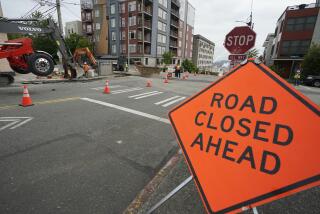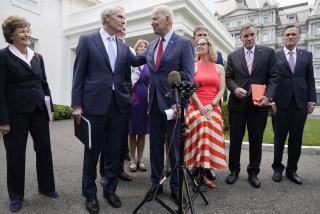Crisis hits as Brazil builds
- Share via
SAO PAULO, BRAZIL — With investors and credit markets spooked by the global financial crisis, Brazil is facing delays in crucial billion-dollar public works projects that it needs to modernize its economy and join the upper tier of world powers.
Word of likely delays in electric power, oil and wood pulp projects comes as Brazil hosts an emergency meeting today in Brasilia of leaders of Mercosur, the trade bloc that includes Argentina, Uruguay, Paraguay, Chile and Bolivia.
Markets across the hemisphere were battered last week. Brazil’s main stock index, Bovespa, plummeted nearly 40% this month after the finance minister encouraged banks to merge and the nation’s central bank said it was committing $50 billion in reserves to shore up the currency, the real, which lost 17.5% of its value against the dollar last week.
Prices of commodities, on which Brazil and other countries in the region depend, sank like stones. The World Bank, Inter-American Development Bank and International Monetary Fund all said they would offer billions of dollars in short-term credit to Third World countries reeling from the global shocks.
In Brazil, the mood has darkened since mid-September, when President Luiz Inacio Lula da Silva flippantly referred to the crisis as “President Bush’s problem” and assured Brazilians that hundreds of billions’ worth of major port, road and electric power projects would go ahead.
But in recent weeks, the credit crunch has begun to affect plans near and dear to Lula’s heart, including a $250-billion Growth Acceleration Program in partnership with private industry. The plan was designed to make up for a 25-year deficit in public works construction since currency devaluations and hyperinflation plagued Brazil in the 1980s and 1990s.
Central Bank President Henrique Meirelles, who last month said the nation had enough reserves to protect the currency, is taking a more cautious tone these days. He told reporters Friday the “situation is very, very serious. We should stop making jokes about it.”
The gravity became evident Friday, when the leader of a 160-member group of the nation’s largest contractors, known by its initials ABDIB, pleaded with Lula to establish a $5-billion emergency loan fund to provide short-term credit for infrastructure projects already in progress or about to begin construction.
“Credit is closing down or getting expensive,” said spokesman Jose Casadei of ABDIB. He added that $40 billion in hydroelectric projects, some situated in the Amazon, were among those in jeopardy.
Last week, Brazil announced it was putting off an auction for building the $3.5-billion Rio Madeira high-tension power line stretching from the Amazon basin to the outskirts of Sao Paulo. State-controlled oil company Petrobras indicated it may delay a deadline for proposals from companies interested in exploring a promising offshore field called Pre-salt, a project that could put Brazil in the major league of oil exporters.
Other Latin American nations are coming to grips with the crisis. Mexico said last week it would put off initial phases of a multibillion-dollar port and rail project called Punta Colonet in Baja California, 150 miles south of San Diego. According to the plan, the project would rival the Long Beach-Los Angeles port complex.
Big private projects also have been affected, including new and expanded mines in Peru and Chile, and the construction in southern Brazil of a huge wood pulp factory. The factory’s promoter, Aracruz, was one of several companies burned by the collapse of Brazil’s currency in recent weeks.
The crisis hit Brazil -- flush with four years of economic growth, strengthened public finances and growing investor confidence -- as it was preparing a massive push to address its infrastructure gap.
Brazil has added little in the way of ports, roads, electric power capacity and air terminals since the late 1970s. The nation’s stagnant economy and debt default in the 1980s, and boom-and-bust cycles in the 1990s, made planning and financing such megaprojects next to impossible.
Now, a healthier economy has only made the infrastructure deficit more acute. Those arriving at Rio de Janeiro’s international airport, for example, are met by an overpowering stench emanating from the surrounding saltwater lagoon that has become a sewage catch basin for much of the city.
The lack of adequate infrastructure also is apparent during the soybean harvest at the port of Paranagua south of Sao Paulo, where trucks line up for 15 miles to unload their cargo. Sao Paulo’s chronic gridlock bespeaks the lack of a ring road around the metropolis of 18 million residents.
A dry season in the Amazon, where much of the nation’s hydropower is generated, could lead to a nationwide electricity brownout, said Adriano Pires, director of the Rio-based think tank Brazilian Center for Infrastructure.
“We are now dealing with the consequences of low growth and the weakened capacity of the state to plan and implement public policy,” said Joao Carlos Ferraz, an economist at a Rio-based development bank known by its initials BNDES.
To respond, Lula had pushed for the construction of a variety of projects under the Growth Acceleration Program, including a north-south railroad, two major hydroelectric dams in the Amazon, liquid natural gas facilities and 4,000 miles of roads.
In a twist for a longtime socialist, Lula was leaving much of the financing for megaprojects not to Central Planning but to private companies. Advisor and former Finance Minister Delphim Netto said Lula realized he couldn’t pay for his ambitious social projects while also funding brick-and-mortar projects.
Now the projects may remain plans for some time.
“The government will have to cut spending,” said Paulo Levy, an economist with the IPEA think tank in Rio de Janeiro. Plans to finance public works were based on tax revenue projections “that are falling because of the crisis.”
Aldo Musacchio, a Harvard Business School economic historian and Brazil expert, said he doubted the infrastructure projects would get done.
“The higher cost of capital for Brazil is an obstacle, as well as the uncertainty that the crisis has brought upon the economy,” Musacchio said. “They still haven’t grasped how harsh the crisis will be.”
--
--
Special correspondent Marcelo Soares contributed to this report.
More to Read
Sign up for Essential California
The most important California stories and recommendations in your inbox every morning.
You may occasionally receive promotional content from the Los Angeles Times.













